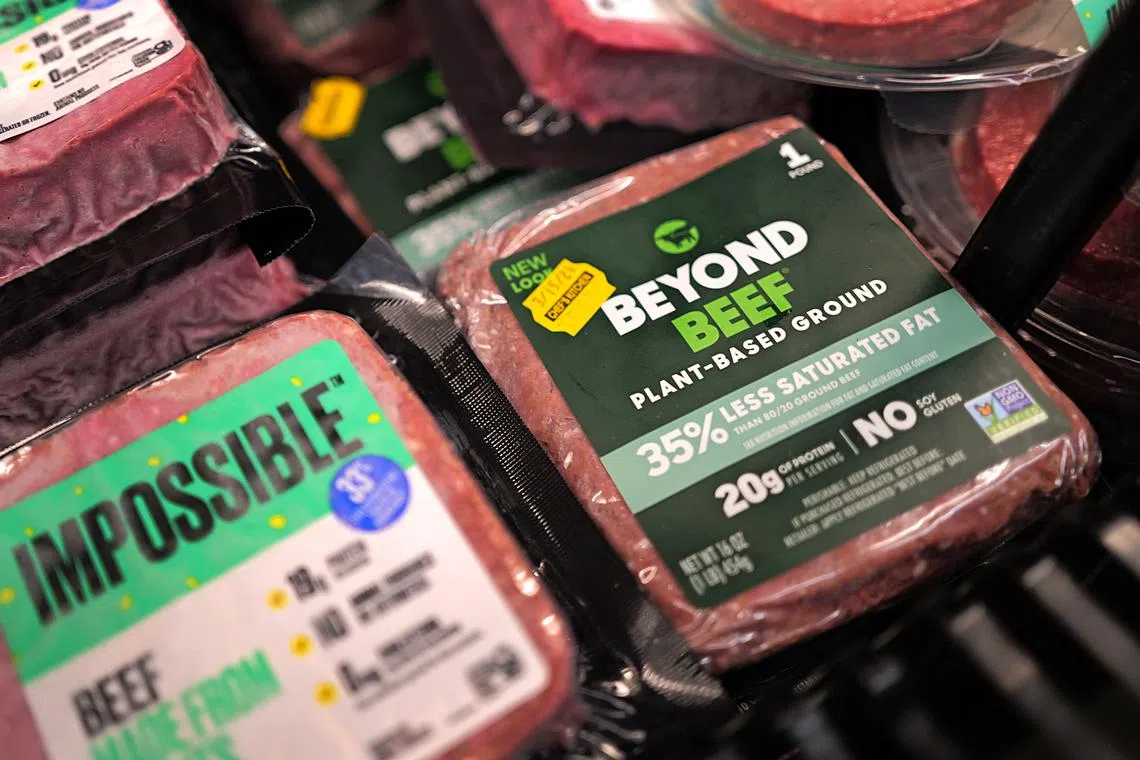Plant-based meat substitutes might be bad for diabetics: S’pore study
Sign up now: Get ST's newsletters delivered to your inbox

The study found that plant-based meat analogue diets did not have any health advantage over a meat-based diet.
PHOTO: AFP
SINGAPORE – Eating vegetables, fruit and nuts is better for your health than eating meat, but not if they have been made into plant-based meat analogues, or substitute meat.
An eight-week study by researchers here, involving 82 volunteers, found that plant-based meat analogue diets did not have any health advantage over a meat-based diet.
In fact, the study, published in The American Journal of Clinical Nutrition in April, said that, based on the results of three days of continuous glucose monitoring, those on the animal-based diet had better glycaemic control – an important consideration for diabetics.
The researchers said the findings suggest that, despite the well-documented health benefits of traditional plant-based diets, their health benefits should not be conflated with plant-based meat analogue diets.
The team from the Singapore Institute of Food and Biotechnology Innovation, a research institute under the Agency for Science, Technology and Research, decided to do the study given the growing popularity of plant-based meat analogues.
It wanted to see the impact of these meat substitutes on cardiometabolic health – including the heart, blood vessels and blood sugar, cholesterol and pressure levels – relative to animal-based meat diets that most people are on.
The team said that while “the cardiometabolic advantages of vegetarian and vegan diets compared with omnivorous diets are well established”, the production of the analogues involves deconstruction and reconstruction of traditional plant-based foods that introduce “potential unintended consequences on various health-promoting constituents inherently present in these plant-based ingredients”.
Over the eight weeks, participants substituted their normal protein intake with fixed quantities provided by the research team led by Dr Darel Toh.
The 42 people on the animal-based meat diet (ABMD) received a selection of six frozen foods that were broadly categorised as beef mince, pork mince, chicken breast, burger patty, sausage and chicken nugget.
The 40 people on the plant-based meat diet (PBMD) were given Impossible Beef (Impossible Foods), OmniMeat Mince (OmniFoods), Chickened Out Chunks and Little Peckers (The Vegetarian Butcher) and Beyond Burger and Beyond Sausage Original Brat (Beyond Meat).
All participants had an in-person study visit at the start and again at the end of the study period, as well as online consultation sessions at weeks two and five. In addition, 37 participants did 14-day continuous glucose monitoring, and 40 had 24-hour ambulatory blood pressure monitoring.
The results showed that “contrary to our research hypothesis, we failed to substantiate any clear benefits for PBMD on cardiometabolic health compared with the corresponding ABMD”, the team said.
However, one finding might be significant for the 9.5 per cent of the population here with diabetes. The study found that the group on ABMD had better glycaemic control.
The team suggested: “For the future adoption of plant-based meat analogues, cautionary advice may be warranted for populations with heightened cardiometabolic health risks, where glycaemic management is essential. Particularly for these more vulnerable populations, there may be a greater need for a careful reformulation of existing plant-based meat analogues with either low- or better-quality carbohydrates.”
Dr Christiani Jeyakumar Henry, one of the study’s six researchers, said: “We are very proud that a team from Singapore did the first study of its kind in Asia where we fed head to head meat-based versus plant-based meat analogues in humans.”
Dr Desmond Teo, an internal medicine specialist at Alexandra Hospital, was cautious about the plant-based meat analogues’ impact on diabetics.
He pointed out that the group on PBMD had higher waist circumference and body mass index (23.2, versus 21.9 in the group on ABMD), which are associated with insulin resistance. These factors could have affected their glucose regulation. The Health Promotion Board defines a good BMI as 18.5 to 22.9.
The PBMD diet also had “higher total fat, carbohydrates, dietary fibre, sodium and potassium”, which could also account for their higher mean glucose readings. Dr Teo concluded: “There are a lot of variables that may have explained the glycaemic control rather than PBMD itself.”
However, Dr Ben Ng, an endocrinologist in private practice, called it “a very detailed study which highlights several important factors”. Endocrinologists are experts in hormone-related problems, including diabetes. Dr Ng, who has a clinic at Mount Elizabeth Novena Specialist Centre, said: “Blood sugar control is extremely important to prevent complications related to diabetes.
“This study potentially shows that PBMA (plant-based meat analogue) diet may be associated with higher blood sugars. Therefore, caution has to be advised for individuals with diabetes who are trying to reduce their meat consumption. I think it is important to consume less red meat, but using an alternative such as PBMA may be counterproductive.”
He added that the lack of changes in cardiometabolic factors also lends credence to the fact that adopting a purely plant-based meat alternative diet completely over conventional ABMD may be taking a step too far if performed purely for health reasons.
Dr Ng said people with diabetes should strive for a balanced and healthy diet, and increasing consumption of fruit and vegetables and legumes is important. But “there is insufficient evidence to recommend the consumption of plant-based meat analogues over conventional animal-based meat diets for health reasons in individuals with diabetes”.
Correction note: In an earlier version of the story, we wrongly named Dr Darel Toh as Dr Darel Wee. We are sorry for the error.



